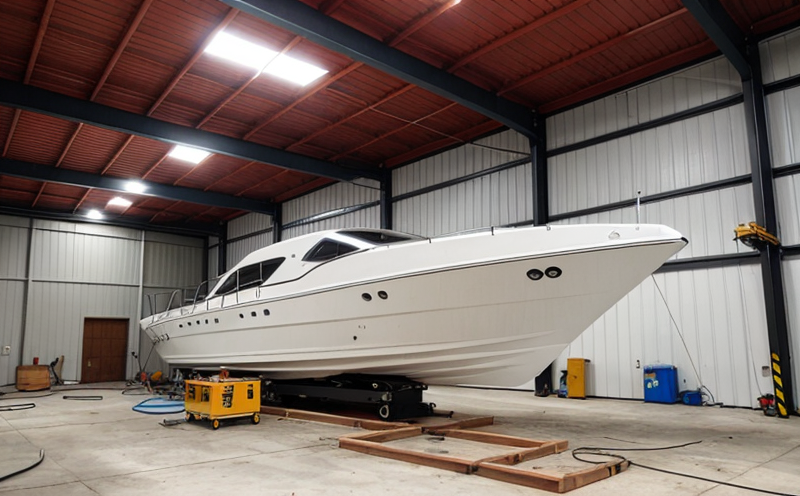ASTM D3039 Tensile Testing of FRP Ship Hull Materials
The Marine & Ship Equipment Testing sector plays a crucial role in ensuring the safety and reliability of marine structures. Within this realm, the Hull & Structural Integrity Testing category is essential for validating the structural integrity of materials used in ship hulls. One specific service within this category is the ASTM D3039 tensile testing procedure, which assesses the mechanical properties of fiber-reinforced polymer (FRP) materials used in ship hull construction.
The ASTM D3039 standard provides a robust method for determining the tensile strength and modulus of FRP materials. This service is vital because it ensures that the materials meet strict performance criteria, which is critical for the longevity and safety of ships in harsh marine environments.
The ASTM D3039 procedure involves testing samples to failure under controlled conditions. The specimens are typically small rectangular pieces cut from the larger structural components of ship hulls. This allows engineers to extrapolate findings about the material's performance across a broader context. Understanding tensile properties is crucial for ensuring that materials can withstand the stresses encountered during ship operations, such as wave impacts and dynamic loading.
The testing process follows precise procedures outlined in ASTM D3039. Specimens are carefully prepared by cutting them from larger pieces of FRP to ensure they accurately represent the material's characteristics. The specimens are then clamped into a tensile testing machine where they undergo controlled stretching until failure occurs. Throughout this process, stress and strain measurements are recorded using high-precision equipment.
The results obtained from ASTM D3039 testing provide critical insights into the mechanical behavior of FRP materials under tension. This information is invaluable for quality managers, compliance officers, R&D engineers, and procurement specialists who rely on these data to make informed decisions about material selection and design improvements.
- Ensures Compliance with Industry Standards: ASTM D3039 ensures that the tested materials meet international standards such as ASTM, which are recognized globally for their reliability and accuracy.
- Predicts Material Performance: By understanding tensile properties, engineers can predict how FRP materials will perform under real-world conditions in marine environments.
- Enhances Reliability of Ship Hulls: Testing helps to identify any weaknesses or vulnerabilities in the material that could compromise the structural integrity of ship hulls.
- Supports R&D and Innovation: The insights gained from ASTM D3039 testing can drive continuous improvement in FRP formulations, leading to more robust materials for future marine applications.
The precision and accuracy provided by ASTM D3039 are essential for the Marine & Ship Equipment Testing sector. By adhering to these standards, manufacturers can ensure that their products meet the highest quality and safety requirements, thereby enhancing the overall performance and longevity of marine vessels.
Scope and Methodology
The ASTM D3039 procedure is designed to determine the tensile strength and modulus of FRP materials used in ship hull construction. This service follows a specific scope that includes the preparation, testing, and evaluation of specimens cut from larger structural components.
Preparation of Specimens: The first step involves cutting small rectangular pieces from the larger FRP components. These specimens must be representative of the material's characteristics throughout the ship hull structure. The dimensions are typically 25 mm wide by 100 mm long, and they should have parallel surfaces free from imperfections.
Testing Procedure: Once prepared, the specimens are clamped into a tensile testing machine. The machine applies controlled stretching forces until the material fails. During this process, stress and strain data are continuously recorded using high-precision sensors. This data is crucial for determining both the maximum load the material can withstand (tensile strength) and its stiffness under tension (modulus).
Evaluation of Results: After testing, the results are analyzed to ensure they meet the acceptance criteria specified in ASTM D3039. These criteria include minimum tensile strength values that must be exceeded for the material to pass. Compliance with these standards ensures that the tested FRP materials can reliably perform their intended functions in marine environments.
The methodology used in ASTM D3039 testing is highly standardized, ensuring consistency and repeatability across different laboratories and test facilities. This standardization is vital for maintaining high-quality control and reliability in ship hull material production.
Why Choose This Test
- Comprehensive Evaluation: ASTM D3039 provides a comprehensive evaluation of the mechanical properties of FRP materials used in ship hulls.
- Global Recognition: The test results are recognized globally, ensuring consistent quality standards across different regions and laboratories.
- Informed Decision-Making: By using ASTM D3039, stakeholders can make informed decisions about material selection and design improvements.
- Rigorous Standardization: The procedure adheres to rigorous international standards, ensuring high precision and accuracy in test results.
- Enhanced Reliability: Compliance with ASTM D3039 helps enhance the reliability of ship hulls, contributing to safer marine operations.
- Support for Innovation: The insights gained from this testing can drive continuous improvement in FRP formulations, leading to more robust materials for future marine applications.
The ASTM D3039 tensile test is a critical service within the Marine & Ship Equipment Testing sector. By providing precise and reliable data on material properties, this test ensures that ship hull materials meet the highest quality standards, thereby enhancing the safety and performance of marine vessels.





